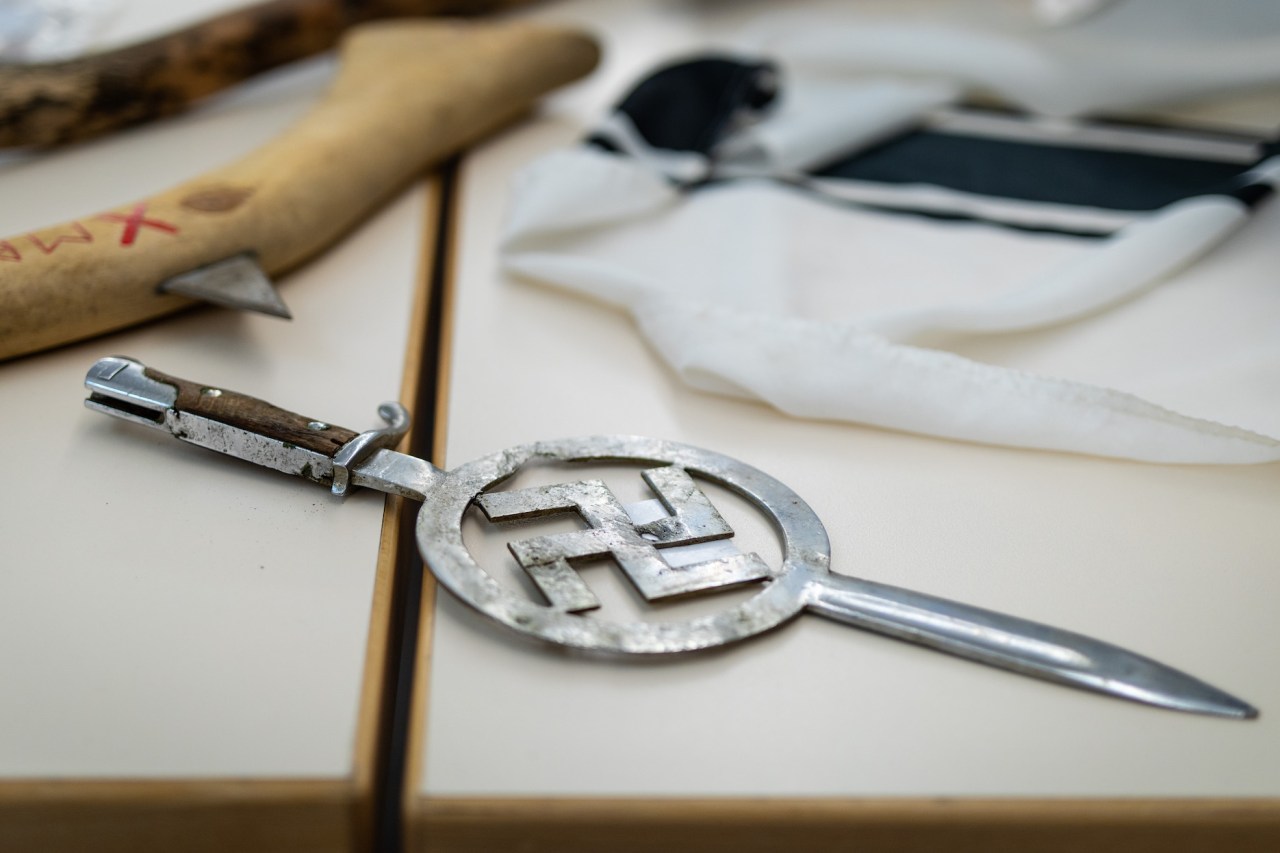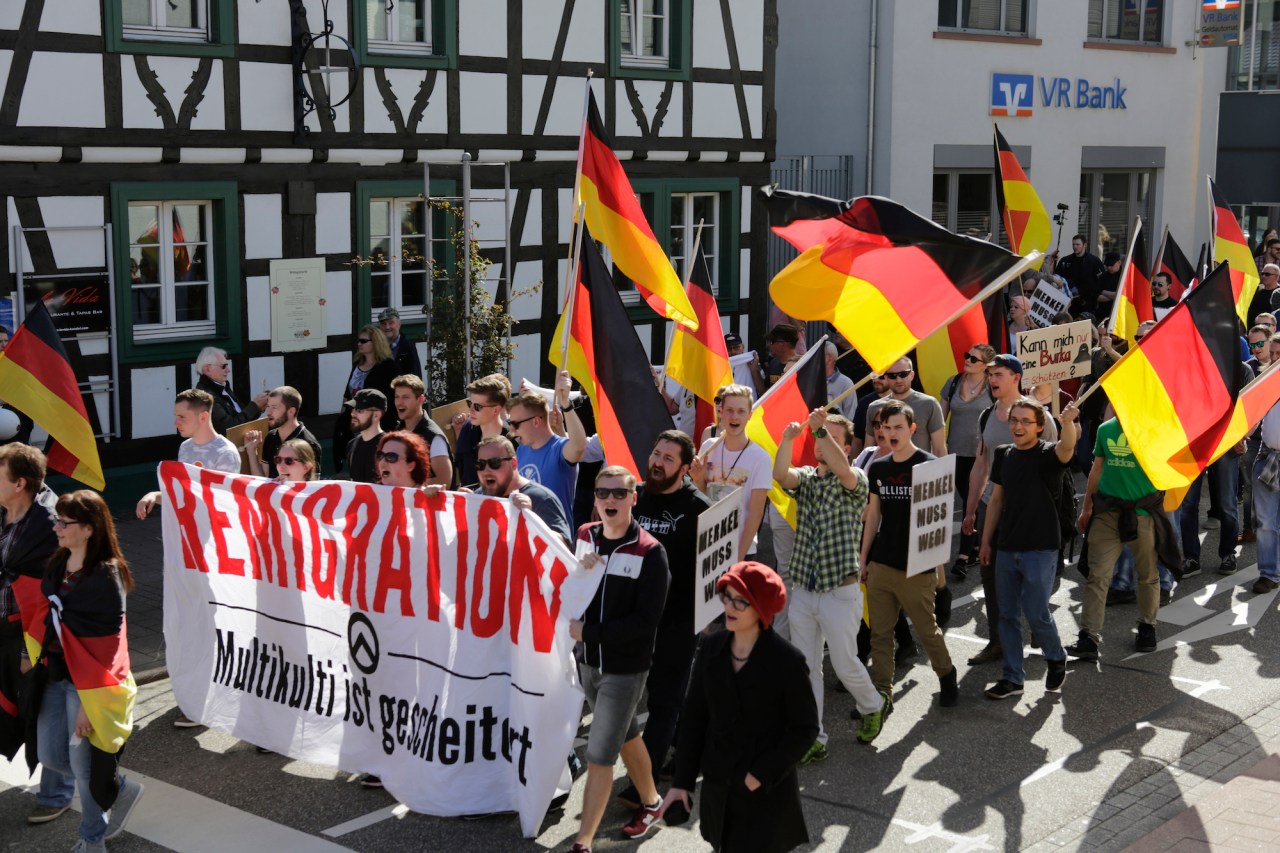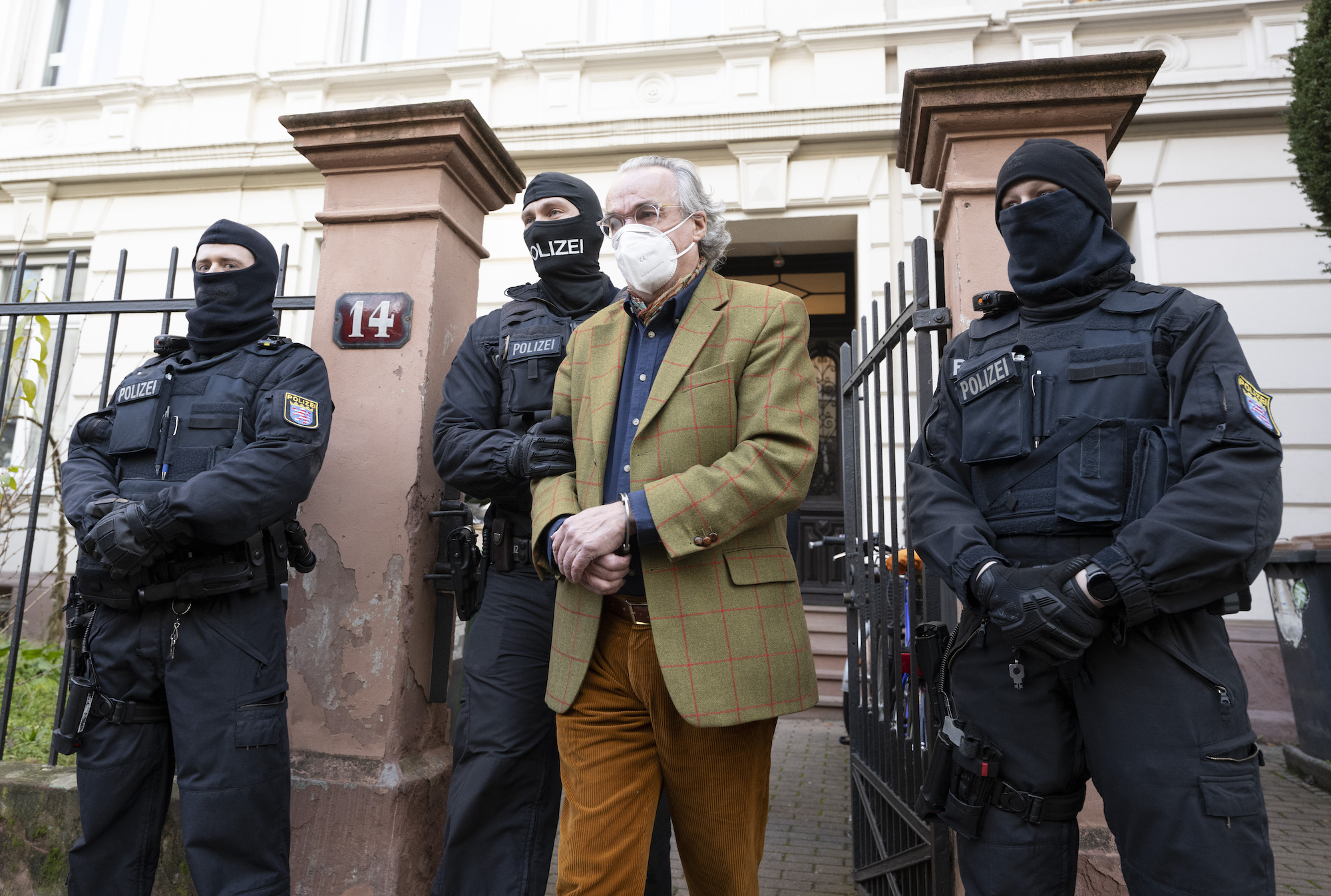On a chilly December morning, the life of one German aristocrat would change forever. Heinrich XIII Prince Reuss had until then lived a pretty pleasant life—as one would expect of the son of a former Prince and a former Duchess. Although the aristocracy in Germany lost its formal privileges during the Weimar Republic, its families still retain their titles and significant wealth: The 71-year-old Prince Reuss loved fast cars and drove an Audi S6 with tinted windows, owned a beautiful pre-war apartment in an expensive part of Frankfurt am Main, and liked to host golf tournaments and meetings with like-minded people at his elegant, Gothic Revival hunting lodge, Waidmannsheil, in Thuringia.
Life was good, but Prince Reuss thought it could be so much better. The problem, he believed, was nothing less than an illegitimate German state established by a Jewish world elite in the latter's quest to eliminate "legitimate" monarchies and wrest control from "true" Europeans. Standard antisemitic, racist conspiracy drivel—but even the most ludicrous beliefs can become dangerous when shared by enough people, or by the wrong ones.
On Dec. 7, German authorities conducted a nationwide raid on about 150 properties, arrested at least 25 people, and secured 93 weapons. In the aftermath the story began to emerge, of a planned coup of the government, led by Prince Reuss and an extremist movement known as the Reichsbürger. Shock mixed with anger: People wondering how such a thing could happen in Germany (Coups, here? Never!), and expressing disgust that racist, antidemocratic ideologies had spread for years without serious address from authorities. With about 3,000 personnel on the ground, the "Reichsbürger Razzia," as the raid was called, became one of Germany's largest-ever domestic counter-terrorism offensives, with further arrests in the Austrian luxury ski destination Kitzbühel and in Perugia, Italy.
The accusations described something out of a movie: A group of people belonging to the Reichsbürger circle had plans to storm the German parliament, cut the power supply, incite wartime conditions—which would allow the military to take over—establish an interim government, and reinstall a monarchic system modeled after the German empire that existed until 1918.
This was most Germans’ first real look at Heinrich XIII Prince Reuss, who was accused of acting as the conspirators' ringleader. There he was, a 71-year-old aristocrat, supposedly one of the main organizers and financiers of a plot to overthrow the government and claim the crown of a new German empire, being led away by police in his checkered olive-green suit jacket and rust-colored trousers. But what made this plot so unnerving was the number of people allegedly involved, and how much power they already held.
Prince Reuss's accused co-conspirators included Birgit Malsack-Winkemann, a judge in Berlin who was a former member of parliament for the far-right Alternative for Germany (AfD) party; a former city council member also from the AfD; several police officers; and several former and current members of the German military and special forces. The latter group raised the most alarm bells: Highly trained military personnel with access to weapons of war were part of a plan to overthrow the government by violent force, kidnap the current Minister of Health, and "sentence" members of parliament for their "crimes during the pandemic." One Telegram group associated with the terror cell spoke of a "Nürnberg 2.0," referencing the post-war trials of Nazi leaders that ended with their executions.
The terror cell had already established a "shadow cabinet" that would be ready to step in immediately and take over the business of government. Prince Reuss would be the head of state and already had a designated personal assistant. Malsack-Winkemann would be the Minister of Justice. Other posts, such as future Health and Foreign Ministers, had also been filled.
Although many were quick to point out that the group's planned coup would have been very unlikely to succeed, the fact that this many people with actual power in Germany were willing to inflict severe violence for their anti-democratic aims was enough of a shock to warrant some serious introspection. How did this get as far as it did?
In order to understand who these people actually are and what they believe, it's necessary to take a step back and look at the emergence of the Reichsbürger movement in Germany. The Federal Office for the Protection of the Constitution (BfV) estimates around 23,000 active members within the movement, although Andreas Speit, a journalist and author specializing in far-right extremism in Germany, warns that the actual figures probably are much higher. "Members" isn't exactly the right word, either. The Reichsbürger isn't necessarily a formal organization, instead often consisting of regional pockets and loosely banded groups.
The figure cited by the BfV also includes so-called "Selbstverwalter"—self-governing individuals—who simply reject the authority of the German state for personal reasons not necessarily including a desired return to the German empire of the 19th century. Common among these is the creation of their own passports, drivers licenses, and other official documents that haven't been issued by the "fake state."
If this sounds familiar, it’s because Selbstverwalter are spiritual cousins to the U.S. sovereign citizen movement, which originated in the mid-20th century and shares many of the same beliefs. According to Speit, Selbstverwalter also share a lot of similarities with the U.S. “prepper” scene: fetishes for self-reliance and doomsday scenarios. Whether Selbstverwalter—and by extension Reichsbürger—draw specific influence from these American movements is unclear, although there has always been an animated exchange and borrowing of terms and language among these groups
"Reichsbürger" means "citizens of the empire," and that's exactly what drives the ideology of this movement. Reichsbürger yearn for the days of the Reich, which usually refers to the period of monarchic rule from 1871 to 1918. Other groups, such as neo-Nazis, are sometimes also included in these categories, although they tend to focus more on re-establishing the Third Reich, as Germany was known under Nazi rule in the 1930s and ‘40s.

A principal Reichsbürger belief is that the Allied forces still control modern Germany, which is not a true sovereign state, and that these Allied forces in turn are governed by dark foreign powers which can include but are not limited to "Zionists and western bankers," also referred to as the "Rothschilds and Rockefellers," "foreign financial forces," and "global puppet masters." Some Reichsbürger go as far as to claim that Germany is in fact not a state but a Limited Liability Company (GmbH in German), with judges and politicians being employed by the LLC.
Because Reichsbürger believe that the true German state ended in 1945, the re-annexation of territory belonging to other states such as Poland or the Czech Republic is considered a given. Most Reichsbürger also deny the Holocaust or severely minimize the extent of the genocide.
Speit links German authorities' continual underestimation of the Reichsbürger to the extremism of the latter's beliefs. “When people saw them in their fantasy uniforms, heard their rambling speeches and the demands they made, it was easy to think that there were bigger problems [than the Reichsbürger],” Speit says. “Because of this, the potential for radicalization in this political movement wasn’t really acknowledged.” And although the murder of a policeman in 2016 at the hands of a Reichsbürger made real for many the movement's potential for violence, the window of concern was small.
“People don't want to believe that after 1945, Germany once again has a right-wing extremist scene,” Speit says. “These events are always quickly forgotten and repressed.”
Reichsbürger have been around as a loose movement since at least the 1980s, and Speit says that “Reich-oriented movements emerged immediately after 1945.” But the pandemic gave them a platform, an audience, and some very influential allies. Strangely enough for a movement so nationalistic and insular, the Reichsbürger gained supporters and ideological inspiration from an international network of fringe conspiracy groups and far-right political movements. Among those movements, there was one in particular whose influence spread in Germany like a summer wildfire: QAnon.
In the United States, QAnon began as a decentralized, mainly online conspiracy theory movement rooted in antisemitism, racism, and paranoia. For many Americans, events such as 2016’s "Pizzagate" came to define QAnon as a movement promising to reveal to its followers the "truth," which in this case came to mean a global elite dedicated to cannibalism, Satanism, and child sexual abuse. This elite was also said to shape major political events from the shadows, including trying to sabotage Donald Trump's presidential campaign. The fact that Trump won the 2016 election only increased the movement's profile, despite its failure to uncover any Satanist cannibal cabals.
But it was the COVID-19 pandemic that really gave the conspiracist movement wings. Frustration over masking mandates, vaccine recommendations, and social distancing protocols became rich recruitment fodder, both in the United States and abroad. Telegram, an encrypted messaging app, became the leading organizational and communications tool for QAnon supporters and alt-right nationalists across the globe, making planning, crowd-sourcing, and information-sharing easy, immediate, and encrypted.
As QAnon members appeared at pro-Trump rallies and anti-vaccine protests in the US, QAnon shirts and slogans showed up more regularly in other anti-vaccine and anti-masking protests around the world, especially in Germany. In 2021, Joel Finkelstein, co-founder of the Network Contagion Research Institute, a research group studying online disinformation, told the Washington Post that "the QAnon followings in Germany and Japan are particularly strong and growing," and that "there's a metastasization of QAnon from a national story to a global revolution." A 2022 study on QAnon in Germany by the Center for Monitoring, Analysis and Strategy (CeMAS), a German non-profit studying extremist movements, suggested "that German-speaking regions host the largest digital QAnon scene outside the USA."
For Germany, the pandemic summer of 2020 revealed exactly how seamlessly the QAnon movement had settled in alongside native conspiracy groups, and its particular embrace by the "Querdenker." The name roughly translates to "cross-thinkers," a loose affiliation of self-proclaimed "free-thinking citizens" concerned that the government was abusing its power and using the pandemic as an excuse to limit civil freedoms.
Querdenker, like most conspiracy groups, don't have a clear hierarchical structure or organization. Some were aging hippies who believed you could ward off COVID with hemp seed oil and treated their kids with lavender salves instead of vaccines. Some were homeopathic practitioners who prescribed "globuli," little sugar pebbles, as cures for cancer. Some were New Age kooks who disliked the bad vibes of this pandemic business and thought that if you did get sick, you perhaps had done something in your previous life to deserve it. Others were straight-up neo-Nazis and Reichsbürger. At every single Querdenker rally that popped up all over Germany in 2021 and 2022 like a rash, the black-white-and-red Reichsbürger flags were never absent—alongside local and sometimes national AfD politicians who were just "representing concerned citizens."

Germany got a small taste of how dangerous these groups could be on Aug. 29, 2020, when about 400 Querdenker, Reichsbürger, and other components of the German far-right cocktail burst through police barricades and made it up to the steps of the German parliament. The images of Reichsbürger flags waving in front of the columns of the Bundestag building were spread through Telegram in celebration, emboldening and fortifying the movement. Just over four months later, on January 6, 2021, an American mob consisting of far-right groups, extremists, and conspiracy theorists stormed the United States Capitol. Any of them who spoke German would have recognized kindred spirits.
And before long QAnon was at the core of most large conspiracy movements in Germany. The same CeMAS study quoted earlier found that "in Germany, more than one in 10 agree to some extent with central narratives of the QAnon milieu." The study was also able to establish "a strong linkage of QAnon conspiracy narratives with conspiracy movements from the Reichsbürger sphere." German-language Telegram and Facebook groups as well as Youtube channels associated with QAnon exploded as the pandemic dragged on: One Telegram channel called Qlobal-Change, which translated English QAnon posts into German, had around 10,000 subscribers in October 2019; by February 2022, that number had grown to around 140,000.
In a sense, QAnon is one-size-fits-all: Its networks and strategies can be applied to and adapted by a wide variety of anti-democratic and fringe movements animated by antisemitism, a rejection of ruling governments, and fear of a malicious, omnipresent global elite.
The popularity of QAnon in the German-speaking world, and particularly among Reichsbürger, was an invigorating tonic for Heinrich XIII Prince Reuss. He had already become known in certain circles for his rants blaming a "Zionist world order" for every injustice he perceived, including the flagship grievance of several members of the German aristocracy: the Soviet-allied East German government's expropriation of their properties, including lavish palaces and meticulous gardens and hunting grounds, after 1945. The House of Hohenzollern, led today by Georg Friedrich Prince of Prussia, has been particularly loud in its cries for restitution; perhaps inconveniently from a public-relations standpoint, Georg Friedrich's great-grandfather, Crown Prince Wilhelm of Prussia, was a "radical anti-democrat of the extreme right-wing variety" who was "jointly responsible for the birth of the Third Reich," as German historian Lothan Machtan, who studies the connections between the German aristocracy and the Nazis, wrote in his 2021 book The Crown Prince and the Nazis.
Prince Reuss, too, became a familiar figure in German courts, demanding the return of properties such as a majestic art-nouveau theater building in Gera. Sometimes he was successful, sometimes not. Heinrich XIV Lord Reuss, an estranged relative of Prince Reuss, said in an official statement that "the results of these countless court cases have probably been very disappointing for [Prince Reuss] to this day. From my personal point of view, he became a bitter old man who sometimes draws the wrong conclusion from these personal defeats."
In 2019, Prince Reuss gave a series of bizarre speeches in Zürich and Geneva, blaming the Rothschild family for financing global wars in an effort to eradicate monarchies, as well as claiming that the German judicial system was an "illusion" and that "we know courts are businesses and need to generate revenue." In a Youtube video, he claimed that "Germany was registered as a license holder with the UN in 1990," thereby reflecting the Reichsbürger beliefs that Germany is a puppet state controlled by Allied forces. These speeches made him a small star among the Reichsbürger community, although the extent of his influence within that group wouldn't be made clear until last month.
If the coup had succeeded and Heinrich XIII Prince Reuss (codename: "The Crown") been installed as head of a new German empire, he could simply dismiss the German state's ownership of his family's former properties and repossess them. In that respect the attempted coup may have been more—or less—than political in nature, encompassing a very personal and financial dimension for its alleged leader. The Reichsbürger ideology supported Prince Reuss’s conviction that he was the victim of German state oppression, creating a very clear "us versus them" binary peddled by countless fascists before our time and sure to be peddled by countless more in years to come. It also happened to offer him his best shot at snatching the legacy riches he considers his birthright.
Twenty-two suspects, including Prince Reuss, stand accused of membership in a terrorist organization with aims to overthrow the German government. Three others arrestees reportedly are being charged as supporters. Judge Birgit Malsack-Winkemann faces an expedited proceeding to bar her from her profession. The trial dates of other arrested suspects have not yet been announced, but it could take months.
A spokesperson for the Federal Public Prosecutor's Office gave no details about the seized weapons, or whether they would be linked to further charges. The Federal Prosecutor’s Office also did not give any information on whether the investigations had yielded any further suspects; however, the Federal Criminal Police Office says it expects the number of suspects to grow.
We got lucky. The terror cell almost certainly would not have succeeded in taking over the government. But with an arsenal of weapons including handguns, shotguns, swords, knives, and tasers, as well as a hit-list with the names of doctors and politicians, even in failure its toll could have been horrendous. The Reichsbürger are a cautionary tale that shows these movements aren't just fringe gatherings that show up once a year for sparsely attended demonstrations. These are tendrils of hate, greed, and bloodlust that penetrate every layer of our society and claim doctors, lawyers, judges, soldiers, educators, and, yes, princes in their grip. These people have been telling us for years that they're preparing for violence. We need to listen.






